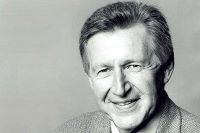
Leo Goodman
Class of 1938 Professor of Sociology and Statistics
Leo Goodman, whose pioneering statistical analysis revolutionized the study of poverty, inequality and other social phenomena, died on Dec. 22, 2020, at Alta Bates Summit Hospital in Berkeley. He was 92. For three decades, Goodman, widely considered to be among the founding fathers of modern statistics, was UC Berkeley’s Class of 1938 Professor in the departments of sociology and statistics. He was.
Among numerous other accomplishments, he pioneered techniques that are still considered a gold standard in sociology scholarship worldwide. Some of the key techniques used in today’s machine learning stem from the work Goodman did in the 1990s and 2000s, his colleagues said. “Statistics and social science today would be unrecognizable without his contributions. He will be missed immeasurably,” said UC Berkeley sociology professor Trond Petersen, executive associate dean of the College of Letters and Science.
Leo Goodman was born on Aug. 7, 1928, in Brooklyn, New York, the son of Abraham Goodman and Mollie Goodman, née Sacks, Ukrainian Jews who emigrated to New York to flee anti-Semitism. After graduating from Stuyvesant High School, he went on to earn a bachelor’s degree in sociology and mathematics from the University of Syracuse, then a Ph.D. from Princeton at the age of 22, where his passion for statistics was ignited by his mentors, Sam Wilks and John Tukey.
In 1950, he joined the faculty of the University of Chicago as an assistant professor of sociology and statistics, one of the nation’s youngest professors. In a 1952 research paper, he revealed a flaw in how U.S. intelligence agencies during World War II had used vehicle serial numbers to estimate how many vehicles were in the German army, and he provided a better way of calculating their numbers.
In addition to authoring more than 150 academic papers and four books, he led and/or collaborated on seminal work, establishing ever new and different ways to measure non-numerical data. “As a statistician, he figured out a rigorous way of using the insights of modern statistics to analyze that kind of qualitative data in a quantitative way. His contributions have transformed the way we work,” said Michael Hout, a UC Berkeley professor emeritus of sociology and demography. “As a friend and mentor, he was gracious, generous, mild-mannered and very patient,” added Hout, now a professor of sociology at New York University.
Indeed, at a time when the social sciences relied on traditional counting methods used in such fields as physics and engineering, Goodman—along with fellow trailblazers like University of Chicago mathematician William Kruskal—found numerical ways to track differences in race, class, gender, religion and other categories. Three statistics used in software worldwide—Goodman-Kruskal Lambda, Gamma and Tau—are named after Goodman and Kruskal because of their contributions.
“Professor Goodman was a pioneer and leading figure in research at the interface of statistics and the social sciences, an area of greater-than-ever relevance today,” said Sandrine Dudoit, UC Berkeley chair of statistics and a professor of statistics and of public health. “His legacy, bridging disciplines and addressing questions of great societal impact, is an inspiration for statisticians as they contribute to data science in terms of both theoretical and methodological foundations and applications to domain disciplines.”
In the 1970s, Goodman was elected to the National Academy of Sciences, the American Academy of Arts and Sciences and the American Philosophical Society. He was also named Outstanding Statistician of the Year by the American Statistical Association’s Chicago chapter.
However, during that same decade, he developed a rare cancer in the muscles of his thigh. Instead of going along with doctors’ recommendations that one of his legs be amputated, Goodman did his own research and found that certain chemotherapy, coupled with innovative surgery, could save his leg and allow him to walk. Even though three of his four quadriceps were removed, over time he retrained his body so that he walked with barely a limp for the next 45 years, said his older son, Andy Goodman, who is Amazon’s vice president for device operating systems.
In 1984, Goodman spent a year at Stanford University’s Center for Advanced Study in the Behavioral Sciences and fell in love with the San Francisco Bay Area. Two years later, he was hired at UC Berkeley as a professor of sociology and statistics. The accolades he received for his work over the next 30 years included the American Sociological Association’s 1995 Award for a Career of Distinguished Scholarship. In 2005, the association also established the Leo A. Goodman Award to recognize contributions to sociological methodology. Leo served on UC Berkeley’s Academic Senate Committee on Courses of Instruction from 1988-89.
On and off campus, he was warm, humorous and upbeat. When asked how he was doing, he would answer, “Not good,” and then, after a long pause, shout, “TERRIFIC!” friends and colleagues recalled. Goodman retired from UC Berkeley in January 2017 at age 88 and later moved into the Silverado Berkeley Memory Care Community.
Goodman is survived by sons, Andy Goodman and Tom Goodman, both of San Mateo County, California; sister, Janice Towers (née Goodman) of Larchmont, New York; his former wife, Ann Hayes of Boulder, Colorado, and five grandchildren.
Yasmin Anwar
Adapted by Andrew Bradt
